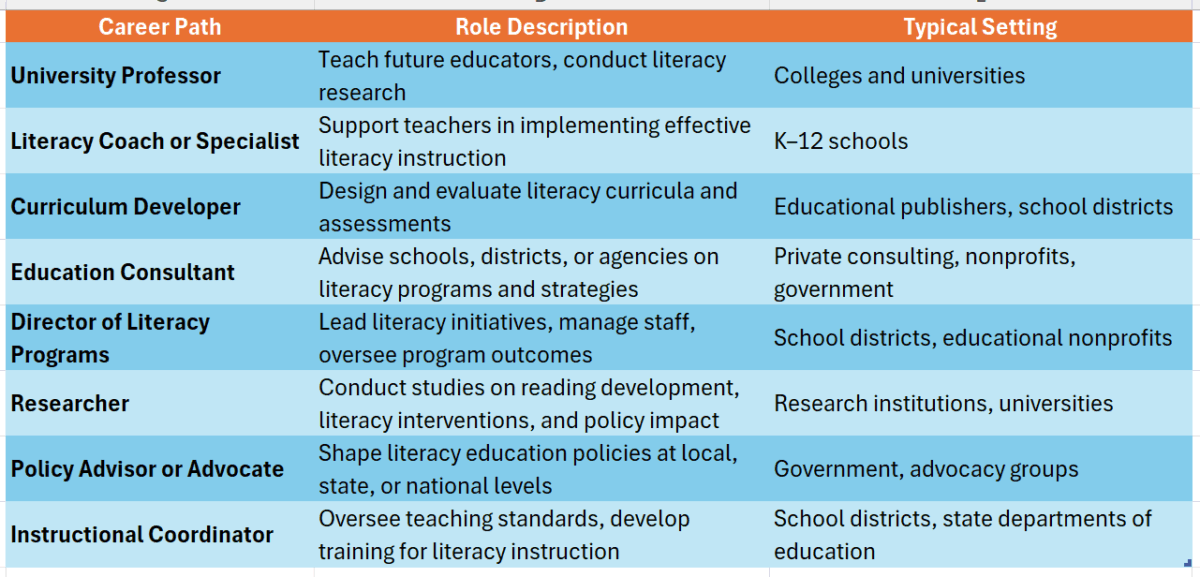Understanding the Doctorate in Literacy Education: An Overview A doctorate in literacy education is a specialized degree that focuses on teaching reading and writing skills. This degree matters because literacy is the foundation of learning. Without strong literacy skills, students struggle in all subjects, making this field crucial for educators and learners alike.
What You Learn in a Doctorate Program
In a doctorate program, you will explore various aspects of literacy, including:
- Reading strategies: How to teach students to read effectively.
- Writing techniques: Methods to improve writing skills.
- Literacy assessment: Tools to measure and enhance literacy levels.
This knowledge is essential for those who want to make a significant impact in education, especially if you’re considering a post doctoral in education.
Benefits of a Doctorate in Literacy Education
Earning a doctorate in literacy education offers numerous benefits:
- Career advancement: Opens doors to leadership roles in education.
- Research opportunities: Contribute to important studies in literacy.
- Online options: Many universities now offer a doctorate in gifted education online, making it accessible for busy professionals.
With this degree, you can become a literacy expert, shaping the future of education and helping students thrive.
Contact Now to Pursue Your Dream Degree From Your Nearest College
What Are the Key Components of a Doctorate in Literacy Education?
A doctorate in literacy education is more than just a degree; it’s a journey into the world of reading and writing. This advanced program equips educators with the skills to enhance literacy among students of all ages. Understanding its key components can help you decide if this path is right for you.
Core Curriculum
The core curriculum typically includes courses on literacy theory, research methods, and instructional strategies. These subjects provide a solid foundation for understanding how people learn to read and write. You’ll also explore the latest technologies that support literacy education.
Research Opportunities
A significant part of a doctorate in literacy education involves conducting original research. This could lead to a post doctoral in education, where you can further investigate specific literacy challenges. Engaging in research helps you contribute to the field and improve teaching practices.
Specializations
Many programs offer specializations, such as a doctorate in gifted education online. This allows you to focus on unique aspects of literacy, like how to teach advanced readers or support struggling learners. Specializing can enhance your expertise and career prospects.
Practical Experience
Lastly, hands-on experience is crucial. Doctoral candidates often work in schools or literacy programs, applying their knowledge in real-world settings. This practical component not only enriches your learning but also prepares you for leadership roles in education.
How Does a Doctorate in Literacy Education Differ from Other Advanced Degrees?
When considering advanced degrees, many people wonder about the unique aspects of a doctorate in literacy education. This degree is not just about reading and writing; it dives deep into how people learn to read and write effectively. Understanding this can help educators shape future generations’ literacy skills, making it a vital area of study.
A doctorate in literacy education stands out for several reasons:
- Focus on Literacy: Unlike a general post doctoral in education, this degree hones in on literacy development, teaching strategies, and assessment methods. It prepares educators to tackle literacy challenges in diverse classrooms.
- Research Opportunities: Students engage in research that impacts literacy practices, which is different from other advanced degrees that may focus on broader educational theories.
- Specialization: While a doctorate in gifted education online may cater to advanced learners, a literacy education doctorate emphasizes foundational skills for all students, ensuring they can read and write proficiently.
In summary, a doctorate in literacy education offers specialized knowledge and skills that are crucial for fostering effective literacy instruction, setting it apart from other advanced educational degrees. This focus not only enhances teaching practices but also supports students’ overall academic success.
Exploring Career Opportunities with a Doctorate in Literacy Education

Considering a career in education? A doctorate in literacy education can open many doors. This advanced degree deepens your understanding of reading and writing while equipping you with the skills to lead and innovate in educational settings. So, what does this degree mean for your career?
Career Paths with a Doctorate in Literacy Education
A doctorate in literacy education prepares you for various roles, including:
- University Professor: Teach future educators and conduct research.
- Curriculum Developer: Design literacy programs that enhance student learning.
- Educational Consultant: Advise schools on best practices in literacy instruction.
Expanding Your Horizons
Pursuing a post doctoral in education can further enhance your expertise, allowing you to specialize in areas like literacy for gifted students. Many universities offer a doctorate in gifted education online, making it easier to balance work and study. With these qualifications, you can make a significant difference in learners’ lives.
The Impact of Literacy Education
This degree not only boosts your career but also positively impacts students. By understanding how children learn to read and write, you can create effective teaching strategies for diverse learning needs.
Leadership Roles
With this degree, you can take on leadership roles in schools, such as becoming a literacy coach, guiding teachers to improve their instruction and fostering a love for reading among students.
Research Opportunities
Engaging in research can influence educational policies, helping shape literacy programs that meet the needs of all learners, including those with special needs or gifted students.
Contact Now to Pursue Your Dream Degree From Your Nearest College
What Skills Will You Gain from a Doctorate in Literacy Education?
A doctorate in literacy education is more than just a degree; it’s a transformative journey into reading and writing. This advanced education equips you with essential skills for understanding how people learn literacy, which is vital in today’s world. So, what skills can you expect to gain?
Critical Thinking Skills
You’ll sharpen your critical thinking skills, learning to analyze and assess teaching methods effectively, crucial for making a real impact in education.
Research Skills
Research skills are another key benefit. You’ll become proficient in conducting studies and evaluating literacy programs, especially important if you consider a post doctoral in education.
Leadership and Advocacy
Additionally, you’ll develop leadership and advocacy skills, preparing you to influence educational policies and advocate for better literacy practices, whether in a doctorate in gifted education online or traditional settings.
Communication Skills
Your communication skills will also improve, enabling you to convey complex ideas clearly and effectively as an educator and literacy advocate.
Curriculum Development
You’ll gain expertise in curriculum development, allowing you to create engaging literacy programs tailored to diverse learning styles.
Collaboration Skills
Collaboration is vital too; you’ll work with teachers, parents, and communities to promote literacy initiatives, fostering a supportive environment.
Understanding Diverse Learners
You’ll develop a deep understanding of diverse learners, addressing unique challenges faced by students from various backgrounds.
Lifelong Learning
Finally, pursuing this doctorate instills a passion for lifelong learning, keeping you updated on the latest literacy research and trends.
How to Choose the Right Program for Your Doctorate in Literacy Education
Choosing the right program for your doctorate in literacy education is a big decision. It can shape your career and influence how you help others learn to read and write. So, how do you find the perfect fit? Let’s explore some key factors to consider.
Understand Your Goals
First, think about what you want to achieve. Are you looking to teach at a university level, or do you want to work in schools? Knowing your goals will help you narrow down your options. For instance, if you’re interested in a post doctoral in education, look for programs that offer research opportunities.
Program Format
Next, consider the format of the program. Do you prefer a traditional classroom setting, or would an online doctorate in gifted education suit you better? Many universities now offer flexible options that allow you to study at your own pace, which can be a game-changer for busy professionals.
Accreditation Matters
Lastly, check if the program is accredited. This ensures that the education you receive meets high standards. An accredited doctorate in literacy education will be recognized by employers and can open doors for your future career. Remember, the right program will not only fit your needs but also help you grow as an educator.
How CollegeDegree.Education Can Support Your Journey Towards a Doctorate in Literacy Education
A doctorate in literacy education is an advanced degree that opens doors to exciting career opportunities. It focuses on developing essential skills in teaching reading and writing, which are vital for student success. With this degree, you can influence educational policies and practices, making a significant impact in literacy education.
Personalized Guidance
At CollegeDegree.Education, we provide personalized support to help you navigate your journey towards a doctorate in literacy education. Our experienced advisors assist you in selecting the right program, whether you’re interested in a post doctoral in education or a doctorate in gifted education online.
Resources and Networking
- Access to Resources: We offer a wealth of resources, including research materials and study guides.
- Networking Opportunities: Connect with fellow educators and professionals to share insights and experiences.
With our support, you can confidently pursue your doctorate in literacy education, ensuring you have the tools and connections needed for success.
Flexible Learning Options
We understand that life can be busy. That’s why CollegeDegree.Education offers flexible learning options, including online classes and hybrid formats that fit your schedule.
Expert Faculty
Our faculty members are experts in literacy education, bringing real-world experience to the classroom. You’ll learn from passionate educators dedicated to your success.
Community Support
At CollegeDegree.Education, you’re not alone. Join a community of like-minded individuals who share your passion for literacy education, engaging in discussions and collaborating on projects.
Contact Now to Pursue Your Dream Degree From Your Nearest College
FAQs
1. What is a Doctorate in Literacy Education?
It’s an advanced degree that prepares scholars, researchers, and leaders to improve literacy instruction, develop curriculum, and influence education policy in schools, universities, and communities.
2. What are the common degree types offered?
Most programs offer either a Ph.D. in Literacy Education (research-focused) or an Ed.D. in Literacy or Reading Education (practice-oriented for educational leaders).
3. Who should pursue this degree?
Experienced educators, literacy coaches, curriculum specialists, or those seeking roles in academia, policy, or leadership positions in education systems.
4. What topics are covered in the program?
Courses often include advanced literacy theory, reading and writing assessment, language acquisition, curriculum development, and qualitative and quantitative research methods.
5. How long does it take to complete the program?
Most programs take 3 to 5 years, depending on full-time or part-time enrollment and dissertation progress.
6. Do I need teaching experience to apply?
Yes, many programs prefer or require applicants to have classroom or instructional experience in literacy or reading education.


